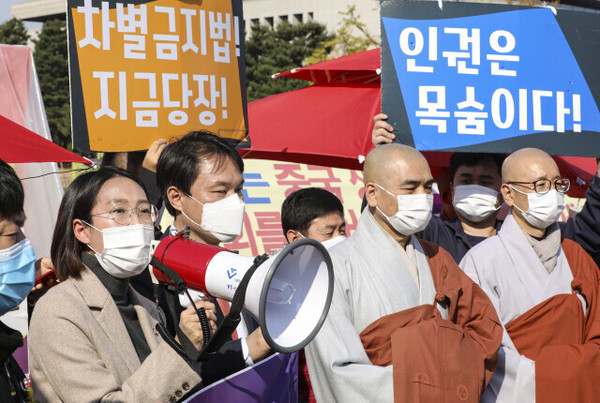Hee-Soo Byun was a soldier. And, she was a woman. All she wanted was to live as both. But on March 3 she was found dead in her home, around a year after she was forcibly discharged from the military for receiving sex-reassignment surgery. Just a few days prior, Korea’s LGBT+ community also lost transgender activist Kihong Kim, a chief organizer of Jeju Pride. Their suicides mark the latest casualties of the battle for acceptance in Korea; the fight against a conservative monolith in a country that seems to be progressing so quickly in other areas.

In the military, Hee-Soo Byun was classified as mentally ill for removing her male genitals, and was subsequently expelled in January 2020. She was the first openly transgender soldier in Korea. She lost a highly publicized reinstatement appeal last July, an outcome that jeopardized her mental health. Nevertheless, she became one of the most prominent transgender activists in Asia at the young age of 22. “Byun protested and resisted against unfair treatment, and that sent a message to the transgender community to act with courage,” said Kyeoul Kim, head of the Trans Liberation Front advocacy group, speaking to The Wall Street Journal. “Her death makes clear how transgender lives are affected by widespread discrimination and hatred.” A memorial vigil was held on March 12 for Byun, Kim, and other trans lives lost, while the community wonders how much more they can take.
Meanwhile, questions over LGBT+ rights have once again risen to the fore in political circles, triggered in February by comments in a televised debate from a prominent candidate in Seoul’s upcoming mayoral election. Discussing the Seoul Queer Culture Festival, which has been held annually since 2000, minor opposition People’s Party leader Cheol-soo Ahn suggested that the “rights [of conservative homophobic groups] to refuse such things should be protected as well”. His remarks have been met with both justified outrage and unsurprised distress, especially in the wake of these recent deaths. What is the difference between refusal and hatred, refusal and discrimination? It’s nothing new. Korean law includes non-discrimination based on sexual orientation in the National Human Rights Commission Act, but simultaneously denies equal marriage, and fails to even fully prohibit discrimination acts on this basis. Similarly, Ahn and other politicians claim to value the protection of minorities but diminish them in the same breath, more concerned about their voter base than human rights.
There is still no anti-discrimination legislation protecting transgender people. If such laws were enacted, would Byun have been able to stay in the military? Would she still be alive? A new bill protecting LGBT+ rights among other anti-discrimination policies was proposed by the Justice Party to the National Assembly in June last year, but has made no progress. It is the eighth such proposal since 2007, which have been contentious — stances on the issue have strong effects on the careers of politicians. Such legislation would by no means be the ultimate solution, nor would it guarantee an equal or just future. But for politicians to continuously treat the “LGBT issue” as a campaign chip, catering to whichever lobby is deemed the most lucrative, is eroding the basis of human rights for a group of people who just want to live.
Being transgender in Korea seems to be a catch-22: either remain silent, try to live with distressing gender dysphoria, and conform to society; or come out, face continuous “refusal”, and live in danger. In a survey of almost 600 trans Koreans conducted last year, more than 65% said they have faced discrimination based on their gender identity and presentation, including losing jobs, being refused entry to businesses, and experiencing verbal and physical abuse. Conservative “Christian” groups routinely show up to Pride parades around the country, protesting the attendees’ very right to existence.
Korea’s LGBT+ community cannot wait indefinitely for social transition. The battle for acceptance is claiming lives with every passing day. Existing as a minority in a hostile society built on conformity is a reality many of us may never have to face. But everyone deserves to live freely as themselves.
For more information, and to donate to the protection and support of transgender people in Korea, visit Jogakbo, a Korean trans rights organization, at http://transgender.or.kr/, and Beyond the Rainbow Foundation, at http://rainbowfoundation.co.kr/.

